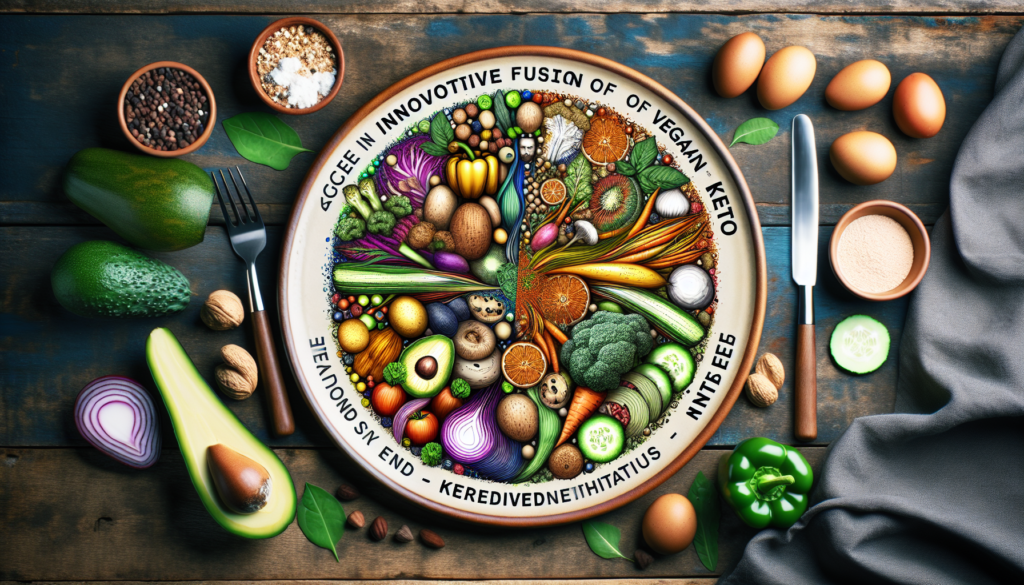You’ve probably heard of vegan diets and keto diets, but have you ever considered combining the two? Well, that’s exactly what the latest trend in plant-based diets, known as Vegan Keto, is all about. This unique approach to nutrition combines the principles of veganism, which eliminates all animal products, with the low-carb, high-fat principles of the ketogenic diet.
As more and more people embrace a plant-based lifestyle, the vegan keto diet has been gaining popularity for its potential health benefits and weight loss advantages. In this article, we will explore the rise of vegan keto and why it has become such a compelling choice for those seeking a sustainable and nutritious way of living.

What is the Vegan Keto Diet?
Definition of Vegan Keto
The Vegan Keto Diet is a unique combination of two dietary approaches: veganism and the ketogenic diet. Veganism is a lifestyle that excludes all animal products from the diet, including meat, dairy, eggs, and honey. On the other hand, the ketogenic diet is a low-carbohydrate, high-fat diet that aims to induce a state of ketosis in the body. In ketosis, the body switches from using glucose as its primary fuel source to utilizing stored fats and producing ketones for energy. The Vegan Keto Diet follows the principles of both these dietary philosophies, emphasizing plant-based foods while restricting carbohydrates and increasing healthy fat intake.
Basic Principles of Vegan Keto
The basic principles of the Vegan Keto Diet involve consuming a primarily plant-based diet while limiting carbohydrates and maintaining a high intake of healthy fats. The diet focuses on consuming whole foods such as vegetables, fruits, nuts, seeds, and plant-based oils, while avoiding all animal products. To achieve and maintain ketosis, individuals following the Vegan Keto Diet typically aim to limit their carbohydrate intake to around 20-50 grams per day. Instead, the majority of calories come from plant-based fats such as avocados, coconut oil, olive oil, nuts, and seeds. Adequate protein intake is also crucial, and it can be obtained from plant-based sources like tofu, tempeh, seitan, and legumes.
Benefits of Vegan Keto
The Vegan Keto Diet offers several potential benefits, which contribute to its increasing popularity. Firstly, the combination of a plant-based diet with ketosis may promote weight loss. By reducing carbohydrate intake and increasing healthy fats, the body is forced to use stored fat as an energy source, resulting in fat loss and improved body composition. Additionally, the Vegan Keto Diet may help improve insulin sensitivity and stabilize blood sugar levels, which can be beneficial for individuals with diabetes or insulin resistance. Furthermore, the diet’s emphasis on whole plant foods provides a rich array of vitamins, minerals, and antioxidants, offering potential health benefits such as reduced inflammation and improved gut health.
Why the Surge in Popularity?
Growing Interest in Plant-Based Diets
The recent surge in popularity of the Vegan Keto Diet can be attributed to the growing interest in plant-based diets worldwide. Many people are embracing a plant-based lifestyle for various reasons, including ethical concerns, environmental sustainability, and potential health benefits. As individuals become more conscious of their dietary choices, they are seeking out innovative approaches that align with their values and goals. The Vegan Keto Diet provides a unique solution, combining the benefits of plant-based eating with the metabolic advantages of ketosis.
Health Benefits of the Vegan Keto Diet
The Vegan Keto Diet offers a range of health benefits, which further contributes to its rise in popularity. This dietary approach has been linked to weight loss, improved insulin sensitivity, and better management of various metabolic conditions such as type 2 diabetes and metabolic syndrome. Additionally, the emphasis on whole plant foods in the Vegan Keto Diet ensures a high intake of fiber, vitamins, minerals, and antioxidants, which are essential for overall health and disease prevention. The potential health benefits associated with this diet make it an attractive choice for individuals seeking to improve their well-being.
Environmental and Ethical Considerations
Another factor contributing to the popularity of the Vegan Keto Diet is its alignment with environmental and ethical concerns. The environmental impact of animal agriculture is a growing concern, with livestock production being a significant contributor to greenhouse gas emissions, deforestation, and water pollution. By adopting a vegan lifestyle and consuming keto-friendly plant-based foods, individuals can reduce their carbon footprint and contribute to a more sustainable planet. Additionally, the Vegan Keto Diet addresses ethical concerns by promoting a compassionate approach that excludes the use of animal products.
Increased Availability of Vegan Keto Products
The surge in popularity of the Vegan Keto Diet is also fueled by the increased availability of vegan keto products in the market. As demand for this dietary approach grows, there is a corresponding increase in the variety and accessibility of plant-based, low-carbohydrate, high-fat options. From mock meats and dairy alternatives to keto-friendly snacks and desserts, individuals following the Vegan Keto Diet now have a wide array of choices to support their lifestyle. The increased availability of these products makes it easier for individuals to adhere to the Vegan Keto Diet and enjoy its benefits.
Navigating the Challenges of Vegan Keto
Potential Nutritional Deficiencies
Like any dietary approach, the Vegan Keto Diet presents certain challenges that need to be addressed. One potential concern is the risk of nutritional deficiencies, particularly in key nutrients such as vitamin B12, iron, calcium, and omega-3 fatty acids. Since these nutrients are commonly found in animal products, vegans following a strict vegan keto approach may need to consider supplementation or incorporate fortified foods into their diet to ensure adequate intake. Regular monitoring of nutrient levels and consultation with a healthcare professional can help mitigate the risk of deficiencies.
Finding Adequate Protein Sources
Another challenge of the Vegan Keto Diet is finding adequate protein sources that are both plant-based and low in carbohydrates. While many plant foods contain protein, they often come bundled with carbohydrates. To maintain ketosis, it is important to prioritize protein sources that are relatively low in carbs. Options such as tofu, tempeh, seitan, and legumes can be excellent choices, as they provide a good amount of protein while minimizing carbohydrate content. Careful meal planning and creativity in the kitchen can help vegans on the keto diet meet their protein requirements without compromising their carbohydrate restrictions.
Balancing Macronutrient Ratios
Achieving the optimal macronutrient ratios on the Vegan Keto Diet can be challenging, as it requires careful planning and tracking. It is crucial to strike a balance between adequate fat intake, moderate protein consumption, and limited carbohydrate intake to induce and maintain ketosis. Individuals following the Vegan Keto Diet may find it helpful to use tracking apps or consult with a registered dietitian to ensure they are meeting their macronutrient goals. Balancing these ratios is essential for reaping the full benefits of the diet and maintaining overall health.
Overcoming Carbohydrate and Sugar Cravings
Restricting carbohydrates can lead to cravings for high-carb and sugary foods, making adherence to the Vegan Keto Diet challenging for some individuals. However, there are strategies that can help overcome these cravings. Incorporating plenty of low-carb vegetables and healthy fats into meals can provide satiety and reduce the desire for carbohydrates. Additionally, exploring keto-friendly alternatives to traditional high-carb foods, such as using cauliflower rice instead of grains, can help satisfy cravings while staying within the dietary restrictions. Over time, as the body adapts to the Vegan Keto Diet, cravings for carbohydrates and sugar often diminish.
Meal Planning and Recipe Resources
Meal planning is key to successfully navigating the Vegan Keto Diet. Planning meals in advance ensures that individuals have access to suitable options and can meet their nutritional needs while following the diet. There are many resources available, such as vegan keto cookbooks, websites, and social media accounts, that provide a wealth of recipe ideas and meal plans tailored specifically to the Vegan Keto Diet. By utilizing these resources, individuals can enjoy a variety of delicious and satisfying meals while staying on track with their dietary goals.
Success Stories and Testimonials
Stories of Weight Loss and Improved Health
Numerous success stories and testimonials attest to the positive outcomes individuals have experienced on the Vegan Keto Diet. Many have reported significant weight loss and improvements in body composition, which can contribute to enhanced self-esteem and overall well-being. By reducing their carbohydrate intake and increasing healthy fats, individuals following the Vegan Keto Diet have witnessed transformative changes in their physique and overall health. These success stories serve as motivation for others considering this dietary approach as a means of achieving their own health and weight loss goals.
Celebrity Endorsements
The Vegan Keto Diet has also gained traction due to celebrity endorsements and public figures adopting this dietary approach. Influential figures in the entertainment industry have spoken out about their positive experiences with veganism and the ketogenic diet, further raising awareness and sparking interest in the intersection of these two dietary philosophies. Celebrity endorsements can generate attention and create a ripple effect, inspiring others to explore the Vegan Keto Diet and discover its benefits.
Influencer Success Stories
Social media influencers and wellness bloggers have played a significant role in the rise of the Vegan Keto Diet. Many individuals have shared their personal experiences, tips, and recipes related to vegan keto living, garnering a dedicated following and inspiring others to embark on a similar journey. The relatability and accessibility of these influencers make them a valuable resource for individuals seeking guidance and support while navigating the Vegan Keto Diet. Their success stories offer practical insights and motivational stories that can make the transition to a vegan keto lifestyle more attainable.

Tips for Getting Started with Vegan Keto
Consulting a Healthcare Professional
Before embarking on any dietary changes, it is advisable to consult with a healthcare professional, such as a registered dietitian or doctor, especially if you have underlying medical conditions or concerns. A healthcare professional can assess your individual needs, provide personalized guidance, and help monitor your progress throughout the Vegan Keto Diet journey.
Transitioning from a Standard Vegan Diet
If you are already following a standard vegan diet and wish to transition to the Vegan Keto Diet, it is important to do so gradually. Start by gradually reducing your carbohydrate intake while gradually increasing your healthy fat consumption. This approach allows your body to adapt to ketosis and minimize potential side effects, such as the “keto flu.” Gradual changes also provide an opportunity to experiment with new vegan keto recipes and meal ideas, ensuring a smooth transition.
Gradually Reducing Carbohydrate Intake
Gradually reducing carbohydrate intake is a key aspect of the Vegan Keto Diet. Instead of drastically cutting out carbohydrates all at once, start by reducing consumption of refined carbohydrates, such as processed grains and sugars. Focus on incorporating more low-carb vegetables, plant-based proteins, and healthy oils into your meals. Slowly decrease your carbohydrate intake over time, allowing your body to adjust and enter a state of nutritional ketosis without feeling overwhelmed.
Experimenting with Vegan Keto Recipes
One of the most exciting aspects of the Vegan Keto Diet is the opportunity to explore and experiment with new recipes. There is a wealth of vegan keto recipe resources available in cookbooks, websites, and social media platforms. Embrace the creativity and variety offered by the Vegan Keto Diet by trying out different combinations of vegetables, plant-based proteins, and healthy fats. Experimenting with recipes can help you discover delicious and satisfying meals that align with your taste preferences and dietary goals.
Prioritizing Healthy Fats and Plant-Based Proteins
When following the Vegan Keto Diet, it is important to prioritize healthy fats and plant-based proteins. Healthy fats, such as avocados, coconut oil, olive oil, nuts, and seeds, are essential for providing energy and supporting ketosis. Plant-based proteins, including tofu, tempeh, seitan, and legumes, provide the necessary amino acids for muscle repair and growth. Incorporating these food groups into your meals will ensure a balanced and nourishing vegan keto diet.
Monitoring Nutrient Intake
Tracking and monitoring your nutrient intake is essential on the Vegan Keto Diet to ensure you are meeting your nutritional needs. A variety of apps and online tools are available to help you track your macros (carbohydrates, fats, and proteins), as well as your micronutrient intake. Regular monitoring allows you to adjust your diet accordingly and make informed decisions about food choices or potential supplementation needs.
Vegan Keto Meal Ideas and Recipes
Sample Breakfast Options
- Avocado and kale smoothie with coconut milk and chia seeds
- Tofu scramble with spinach, mushrooms, and nutritional yeast
- Coconut flour pancakes topped with berries and sugar-free syrup
Easy Lunch and Dinner Recipes
- Zucchini noodles with vegan pesto sauce and almond “parmesan”
- Cauliflower rice stir-fry with mixed vegetables and tofu
- Portobello mushroom “burgers” with lettuce wraps and avocado
Snack Ideas
- Roasted seaweed snacks
- Homemade kale chips seasoned with nutritional yeast
- Raw almonds or mixed nuts (watch portion sizes for optimal keto ratios)
Dessert Recipes
- Vegan chocolate avocado mousse made with cacao powder and stevia
- Chia seed pudding with almond milk and berries
- Coconut milk-based ice cream with added sugar-free flavorings, such as vanilla or coffee
Beverage Options
- Unsweetened almond milk or coconut milk
- Herbal tea or black coffee
- Infused water with lemon, cucumber, or mint

Exploring the Science Behind Vegan Keto
Metabolic Adaptations in Ketosis
When following the Vegan Keto Diet, the body enters a state of ketosis, which involves metabolic adaptations. In ketosis, the body primarily relies on stored fats for fuel, as opposed to glucose obtained from carbohydrates. This shift in metabolism occurs when carbohydrate intake is restricted, leading to increased production of ketone bodies through fat breakdown. Over time, the body becomes more efficient in producing and utilizing ketones for energy, which allows sustained ketosis on a vegan keto diet.
Role of Ketones in Energy Production
Ketones play a crucial role in energy production during ketosis. When the body is in a state of ketosis, ketones become the primary source of energy for the brain and muscles. Rather than relying on glucose, the brain can effectively utilize ketones, providing a steady supply of energy. This metabolic adaptation allows individuals following the Vegan Keto Diet to maintain cognitive function and physical performance despite consuming minimal carbohydrates.
Effects on Blood Sugar and Insulin Levels
The Vegan Keto Diet has been shown to promote improved blood sugar control and insulin sensitivity. By reducing carbohydrate intake, blood sugar levels can become more stable, and fluctuations are minimized. As a result, individuals with prediabetes, type 2 diabetes, or insulin resistance may experience improved glycemic control and reduced reliance on exogenous insulin. However, it is crucial to monitor blood sugar levels regularly and work closely with healthcare professionals when making dietary changes.
Cognitive Benefits of Ketosis
Ketosis induced by the Vegan Keto Diet has been linked to cognitive benefits. The brain can efficiently utilize ketones as an energy source, which may enhance mental clarity, focus, and cognitive performance. Some individuals report improved concentration, memory, and overall cognitive function while following a ketogenic diet. However, more research is needed to fully understand the mechanisms behind these cognitive benefits and the long-term effects of ketosis on brain health.
Research Studies on Vegan Keto
While research specifically on the Vegan Keto Diet is limited, studies have investigated the effects of individual components, such as plant-based diets and ketogenic diets, on various health outcomes. These studies have demonstrated the potential benefits of plant-based diets, including reduced risk of chronic diseases, improved weight management, and enhanced gut health. Likewise, research on ketogenic diets has shown positive effects on weight loss, glycemic control, and cardiovascular risk factors. Combining these two dietary approaches may offer synergistic effects, but more research is required to explore their specific impact on health.
The Intersection of Veganism and Ketogenic Diets
Commonalities and Differences
Veganism and ketogenic diets may appear to be at odds, as one focuses on plant-based foods while the other emphasizes animal products and fats. However, there are commonalities and overlaps between these two dietary approaches. Both veganism and ketogenic diets emphasize the consumption of whole foods, minimization of processed foods, and the importance of nutrient density. The major difference lies in the exclusion or inclusion of animal products and the macronutrient composition. The Vegan Keto Diet aims to bridge these philosophies by adapting the ketogenic diet to a plant-based lifestyle.
Challenges of Combining Veganism and Ketosis
Combining veganism and ketosis presents unique challenges due to the conflicting macronutrient composition as well as the potential risk of nutritional deficiencies. Meeting the goals of limited carbohydrate intake, high fat consumption, and adequate protein intake while excluding animal products requires careful planning and attention to nutrient balance. Individuals following the Vegan Keto Diet must strive to obtain essential nutrients, such as vitamin B12, iron, calcium, and omega-3 fatty acids, through plant-based sources or supplementation to avoid deficiency symptoms.
Addressing Criticisms and Misconceptions
The Vegan Keto Diet has faced criticism and misconceptions, particularly concerning nutrient deficiencies and the sustainability of this dietary approach. Addressing these concerns involves careful meal planning, nutrient monitoring, and consultation with healthcare professionals. Adopting a well-rounded, diverse plant-based diet can help ensure adequate nutrient intake. Additionally, advancements in vegan keto products and recipe development have expanded options and improved the viability and sustainability of this dietary approach.
Sustainability of Vegan Keto
The Vegan Keto Diet raises questions about its long-term sustainability and feasibility. Critics argue that adhering to strict dietary restrictions and the potential monotony of limited food choices may make it challenging to maintain in the long run. However, with an increasing availability of vegan keto products, a growing repository of recipes, and a supportive community, individuals following the Vegan Keto Diet have access to the resources and support necessary for a sustainable lifestyle. As the popularity of the diet continues to grow, innovation and adaptation are likely to drive the long-term sustainability of the Vegan Keto Diet.
Long-Term Viability
Long-term viability is an important consideration when assessing the potential benefits and challenges of the Vegan Keto Diet. While there is a lack of long-term studies specifically on the Vegan Keto Diet, research on other forms of ketogenic diets suggests that long-term adherence can be challenging for some individuals. Long-term success on the Vegan Keto Diet may depend on factors such as individual preference, motivation, access to suitable food options, and overall health status. Regular monitoring of nutritional markers and consultation with healthcare professionals can help guide long-term dietary decisions.

Expert Perspectives on Vegan Keto
Opinions from Nutritionists and Dietitians
Opinions from nutritionists and dietitians on the Vegan Keto Diet are varied. Some experts believe that a well-planned vegan keto diet can provide adequate nutrition and offer health benefits. They highlight the potential for weight loss, improved insulin sensitivity, and increased intake of nutrient-rich plant foods. However, others express concerns about potential nutrient deficiencies and inadequate nutrient intake due to the exclusion of animal products. Consulting with a registered dietitian who is knowledgeable about vegan keto diets can provide personalized guidance and help address individual concerns.
Views from Vegans and Keto Enthusiasts
Views from vegans and keto enthusiasts on the Vegan Keto Diet are diverse as well. Some vegans embrace the Vegan Keto Diet as a way to align their ethical beliefs with the metabolic benefits of ketosis. They appreciate the emphasis on plant-based eating while achieving weight loss and metabolic improvements. On the other hand, some vegans express concerns about the exclusion of whole plant foods due to the focus on high-fat consumption. Keto enthusiasts who adopt the Vegan Keto Diet often see it as a natural extension of their low-carb lifestyle. Their experiences and support can be valuable to individuals embracing this dietary approach.
Critiques and Counterarguments
The Vegan Keto Diet has faced critiques and counterarguments from various perspectives. Some critics argue that the diet is too restrictive and challenging to sustain, particularly for those who are new to either veganism or the ketogenic diet. Concerns are also raised about the nutrient adequacy of a vegan keto diet and the potential risk of deficiencies. However, proponents of the Vegan Keto Diet counter these arguments by emphasizing the availability of suitable plant-based protein sources, the inclusion of nutrient-dense plant foods, and the growing variety of vegan keto products. They highlight the potential health benefits and individual success stories as evidence of its viability.
The Future of Vegan Keto
Predictions on Growing Popularity
As the interest in plant-based diets continues to rise, the Vegan Keto Diet is poised for further growth in popularity. The convergence of veganism and the ketogenic diet taps into two expanding markets and offers a unique dietary approach that appeals to a wide range of individuals. With increased awareness, more accessible resources, and a growing community, the Vegan Keto Diet is likely to gain even more recognition and followers in the future.
Potential Innovations in Vegan Keto Products
The growing demand for vegan keto products presents opportunities for innovation. As the Vegan Keto Diet gains popularity, food manufacturers are likely to invest in product development, resulting in an expanded range of convenient and delicious options. Whether it is plant-based keto snacks, ready-to-eat meals, or innovative substitutes for animal products, the market is likely to witness an influx of innovative vegan keto products that cater to the specific dietary needs and preferences of individuals following this lifestyle.
Emerging Research and Advancements
As the Vegan Keto Diet gains traction, the scientific community is expected to explore its potential benefits and investigate the long-term effects on health. Emerging research is likely to shed light on the impact of the Vegan Keto Diet on various health markers, metabolic conditions, and overall well-being. Advancements in technology and scientific understanding may lead to personalized approaches, tailored meal plans, and more precise dietary recommendations for those following the Vegan Keto Diet. The future holds promise for continued discovery and advancement in this growing field.


